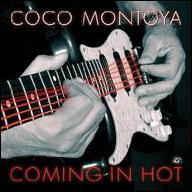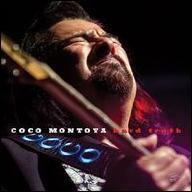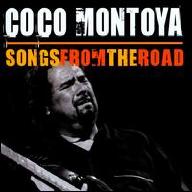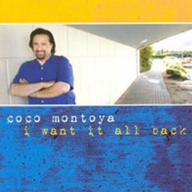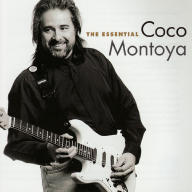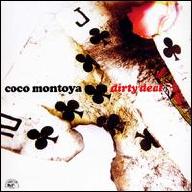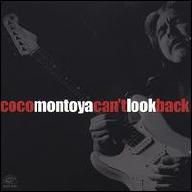Born Henry Montoya in Santa Monica, California in 1951, his childhood home was a treasure trove of music thanks to an enormous family record collection curated equally by his father and siblings. They listened to everything from big-band records to rock & roll and doo wop singles that flooded AM radio. During the early '60s, English musicians including John Mayall and Eric Clapton were redeveloping the electric blues style based on hearing American bluesmen such as Muddy Waters, Howlin' Wolf, and Sonny Boy Williamson. Montoya credits hearing Clapton play Freddie King's "Hideaway" as his initiation to electric blues. As a teen, he taught himself the guitar to voice feelings he couldn’t verbalize. It was his second instrument -- the first was a drum kit. Montoya played in local rock bands and established a rep as a rock-solid player. In 1969 he attended a concert to see Iron Butterfly and Creedence Clearwater. Between sets, Albert King performed. Montoya witnessed him playing "Watermelon Man," and it changed his life: he later said it was the first time he heard music that came straight from the heart.
In the '70s, Texas guitar slinger Albert Collins was booked to play a matinee at a small club in Culver City that Montoya had played the previous night. The club owner gave Collins permission to use his drums. Montoya arrived to pick up his gear and noticed someone had been playing his kit. He was irritated with the club owner. After being informed of this, Collins called him at the club; he was as gracious as he was apologetic. Montoya caught his gig and later told an interviewer "…it just tore my head off. The thing that I had seen and felt with Albert King came pouring back on me when I saw Albert Collins."
A few months later, Collins needed a drummer for a tour of the American Northwest. He remembered Montoya and called him. During the tour, the guitarist took his young charge under his wing, teaching him about blues music and road life. Montoya remained with Collins' band for five years. During that period, the younger man began doubling on guitar. Collins went out of his way to teach him while killing time in hotel rooms. The elder man would have Montoya play along to changes and develop leads organically, asking him not to think, but feel his way through the music. The pair became so close he referred to Montoya as his "son." After leaving the band, the pair remained close until the older man's death from cancer in 1993.
Montoya was back in the small-time nightclub business, by the early '80s bartending and playing guitar with regional bands. During a show he discovered that John Mayall was in the audience celebrating his birthday. In tribute, Montoya launched into a cover of Otis Rush's "All Your Love (I Miss Loving)." Impressed, Mayall left the club with a soundboard tape of Montoya's performance. When he decided to re-form the Bluesbreakers after a 16-year hiatus, he called Montoya. Despite the enormous pressure of filling a spot held previously by Clapton and Peter Green, Montoya grabbed the opportunity. Mayall had not released an album in five years, but the 1985 revival set Behind the Iron Curtain proved the British bluesman's continued viability, thanks in large part to the fiery axe work of Montoya. He remained with the Bluesbreakers for a decade before striking out on his own. Montoya made his leader debut with the 1995 Gotta Mind to Travel for Silvertone in the U.K. and Blind Pig in the U.S. It featured guest spots from Collins (his final recorded performance), Mayall, Debbie Davies, and Al Kooper. It garnered an award in the Best New Blues Artist category at the following year's W.C. Handy Award. After that, Montoya became not only a popular artist among blues fans, critics, and radio programmers, but a mainstay and draw on the scene. He released two more albums for Blind Pig, 1996's Ya' Think I'd Know Better, and 1997's Just Let Go (both charted) before signing to Chicago's Alligator Records for Suspicion in 2000; it reached number ten. Montoya's profile expanded exponentially as his road band toured the globe for more than a year. Upon returning, he recorded 2002's Can't Look Back; it reached number two as the band hit the road for more than three years. After a long break he hit the touring circuit again and in late 2006, he re-entered the recording studio, emerging with Dirty Deal in 2007; it peaked at number two. As his road presence increased, he began headlining European and Asian music festivals. To that end he signed a European deal with Germany's Ruf Records issuing 2010's I Want It All Back (number four) and his first live offering, the double-length Songs from the Road in 2014 (number 15), promoting it with a U.S. tour of festivals and clubs. Montoya returned to Alligator for 2017's Hard Truth, which climbed to number five on the blues charts. After a short tour of festival sheds, Montoya returned to the studio to emerge with Coming in Hot in August of 2019. The set included songs by the teams of Montoya and Dave Steen as well as Tom Hambridge and Richard Fleming. It also included tunes by Warren Haynes, Frankie Miller, Jeff Paris, and Collins. The guitarist's backing band included bassists Bob Glaub (Bob Dylan, Bruce Springsteen) and Mike Mennell (Jimmy Buffett, John Fogerty), keyboardist Mike Finnigan (Jimi Hendrix, Etta James, Taj Mahal), rhythm guitarists Billy Watts (Eric Burdon) and Johnny Lee Schell (Bonnie Raitt), and drummer Tony Braunagel, who also produced the album. ~ Thom Jurek, Rovi


